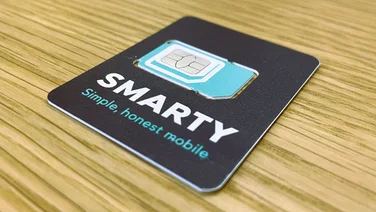To help us provide you with free impartial advice, we may earn a commission if you buy through links on our site. Learn more

Vodafone has just announced that it is rolling out its 5G network to eight more UK locations. The mobile network will be extending the 5G service to Gatwick, Wolverhampton, Birkenhead, Bolton, Plymouth, Newbury, Lancaster and Stoke-on-Trent.
The move comes as part of Vodafone’s broader strategy to extend 5G across the country. The company has announced that it will bring the service to 19 towns and cities in the UK by the end of 2019. However, eagle-eyed fans noticed that two of the new locations to receive Vodafone 5G, Bolton and Lancaster, did not feature on the original lineup for targeted towns, suggesting that the sum total of towns and cities receiving the 5G treatment will in fact be 21, not 19.
The original article continues below.
Vodafone marked the launch of its 5G mobile phone service with the silliest of silly stunts — a haptic rugby tackle transmitted over the network. Wearing a full-body “Teslasuit”, Wasps player Juan de Jong was “tackled” by his teammate Will Rolands, from 100 miles away.
Pointless? Of course. As was the appearance of Vodafone’s new “5G ambassador”, Lewis Hamilton, later on in the event to “switch on” the network. He drives a car fast. 5G is fast. We get it.

It’s easy to understand why the networks are so keen to fall back on gimmicks such as this when the reality of 5G is so humdrum. If it does its job properly, the only exciting thing about it is that it will deliver more reliable, quicker mobile connections with less lag.
So what’s the real news today? We already know 5G will be faster and deliver more reliable connectivity. Do we know how widespread it will be, exactly what download speeds we’re going to get or how much money Vodafone will be charging?
We have some of those answers. As of 3 July, Vodafone has 5G live across a total of seven UK cities, and the Scilly Isles, and that will extend to 19 more towns and cities across the UK by the end of 2019.
READ NEXT: The best Vodafone mobile deals you can find
How much will Vodafone’s 5G contracts cost?
The most significant news is that Vodafone has pledged not to charge a premium for 5G contracts with “no catches”. Prices for the Unlimited Max plan will start at £30 per month for a SIM only contract. That gets you unlimited data and the fastest 5G (or 4G) speed available, with customers paying more on top of that based on which handset they opt for.

There are cheaper contracts available – Unlimited Lite and Unlimited – but those are speed capped, somewhat negating the advantage of having 5G in the first place.
It gets a lot more expensive if you want a 5G phone to go with your 5G SIM card, though. The Samsung Galaxy S10 5G starts at a tasty £70 per month and £49 up front. That’s for 60GB of monthly data and works out at a whopping £1,729 over the two years of the contract. Vodafone’s other 5G handset is the Xiaomi Mi Mix 5G, which is at least a little more reasonable at £58 per month and £49 upfront for 60GB of monthly data – that works out at £1,441 over the length of a two-year contract.
Vodafone also launched its 5G home broadband product at the event – the Huawei-made Gigacube – at a cost of £30 per month, and its “converged” home broadband/mobile contract at a cost of £50 per month for a landline, unlimited 5G mobile data and a free Amazon Echo Plus.

That’s more attractive than the prices EE is asking for its 5G phones and contracts. The next question is, how good is that service going to be? That’s harder to nail down right now. At the event, I was able to try out the Samsung Galaxy S10 5G and the Xiaomi Mi Mix 3 5G but surprise, surprise there were teething troubles. Testing with the FAST app I saw the needle swing around to only 190MB/sec for downloads – it’s supposed to be a lot faster than that.
Still, Vodafone has made a good start with its unlimited data allowances and 4G price matching. Let’s hope the service itself delivers more than it did at the launch.







